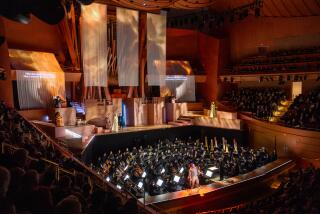FRITZ SHETSLER STILL ON TOP OF WORLD
- Share via
When Fritz Shetsler learned that the Long Beach Opera was set to produce Ernst Krenek’s once-famous and long-neglected “Johnny Strikes Up” on Saturday, he called the composer at his home in Palm Springs and crooned into the telephone a few bars of an aria written for the work’s title character.
“I thought it was a clever way to reintroduce myself to Krenek,” recalls a lively Shetsler, a lyric baritone who sang the title role at the Stuttgart premiere in 1929. With that, he pops up from his seat and belts out the triumphant song in tones still remarkably vibrant.
A mere 88, Shetsler (who simplified his German name, Schaetzler, on becoming a U.S. citizen) is one of those virtually indestructible types--his peril-filled history, physical vigor and affirmative mind-set attest to that.
He lived through two world wars, fighting in the first and surviving the second--Hitler’s reign of terror--as a half-Jew. At the Stuttgart Opera, where the Nuremberg-born artist enjoyed the title Kammersaenger , he gave 3,000 performances over a 30-year span.
“It was 1917, in the battle of Flanders,” recalls Shetsler, “that I was wounded . . . losing a leg and having some paralysis in my right hand. All 30 in my group died. One survived. Until then, all I wanted was to be a German officer. But at 18, one has lots of pride and idealism.”
Knocking on his plastic leg, Shetsler describes how he then turned to singing and finally made an estimable career on the opera stage. He was honored as a war hero (thus escaping the wrath of the Third Reich) and as a noble performer. His autobiography was even made into a feature film.
“But World War II is not something I want to remember,” he says. “Germany became the land I wanted to leave. I’ll never forget the devastation all around us . . . the bright moon shining on the lake near our house (outside Munich).
“ ‘Oh, God,’ I remember thinking, ‘when will this end?’ Then we heard the horrendous sound of tanks approaching. A miracle. They were American. We ran out and kissed the soldiers. We threw open the windows and started singing in the middle of the night.”
Shortly thereafter Shetsler says he sang for generals Eisenhower and Patton, who, out of gratitude, offered to help him. “I told them what I wanted most--to come to the United States. They arranged my family’s visas and we arrived in the United States in 1947.”
Since then Shetsler and his wife, soprano Egidia Bonessi, have taught voice in La Habra, where they live. He retired from the stage while still in Germany, but made the rounds of hospitals singing and dancing for wounded soldiers “to offer them living proof of why they should not give up.”
The special pride he took (and still takes) in mastering his handicap is irrepressible.
“There is a scene (in ‘Johnny Strikes Up’) where Johnny steals the Stradivarius and then leaps up on top of a globe, where he fiddles and sings.” He taps again on the prosthesis. “You think this could stop me?”
As for the opera itself, Shetsler says his memory is fuzzy a half-century later. He says that it was “difficult to understand the ideas,” one reason being that things American were foreign to him.
He does recall meeting Krenek backstage at the 1929 performance and receiving “the usual compliments” for his performance.
But times change. Shetsler won’t be on stage Saturday for the Long Beach premiere of the opera. Instead, he’ll be sitting in the audience, with Krenek, and watching someone else do his old role.
More to Read
The biggest entertainment stories
Get our big stories about Hollywood, film, television, music, arts, culture and more right in your inbox as soon as they publish.
You may occasionally receive promotional content from the Los Angeles Times.










